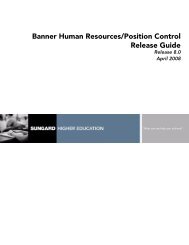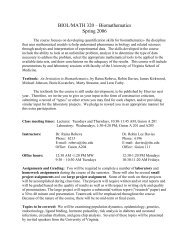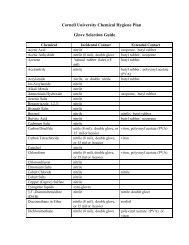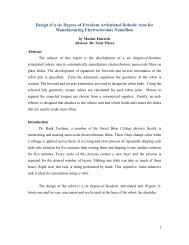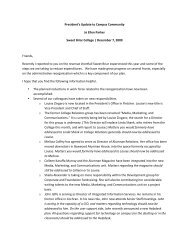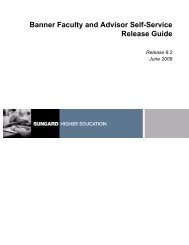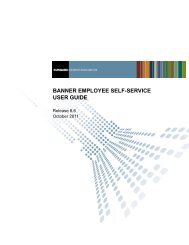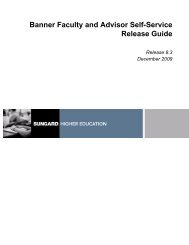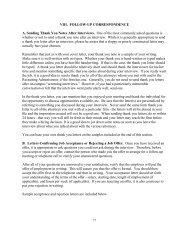sweet briar magazine inside - Sweet Briar College
sweet briar magazine inside - Sweet Briar College
sweet briar magazine inside - Sweet Briar College
You also want an ePaper? Increase the reach of your titles
YUMPU automatically turns print PDFs into web optimized ePapers that Google loves.
“A friend sent me an e-mail about the<br />
fellowship and I said ‘why not’ I had been<br />
searching for a sign that would refocus my life after<br />
my health crisis,” she says.<br />
After an extensive application and interview<br />
process, Carolyn was awarded the fellowship.<br />
Sponsored by Hitachi Ltd., a large, Japanese<br />
technology-based corporation with a global<br />
presence, and the Council on Foreign Relations, the<br />
post is designed for mid-career professionals who<br />
may assist in establishing new links and maintaining<br />
ties between the u.S. and Japan.<br />
e u.S. defense umbrella includes the large<br />
conventional force presence of nearly 47,000 troops<br />
stationed in Japan, strategic commitments in the<br />
region and commitment of extended deterrence<br />
guaranteed by u.S. nuclear forces. Time and events<br />
have strained this arrangement. Aside from<br />
economic problems and potential threats from<br />
China and North Korea, many Japanese are<br />
unhappy with the number of u.S. troops stationed<br />
on their soil. Two incidents related to the Futenma<br />
airbase, home to about 4,000 troops, contributed to<br />
the unrest. e first was the abduction and rape of a<br />
12-year-old Okinawan girl by three u.S. servicemen<br />
in 1995. In 2004 a helicopter crashed into Okinawa<br />
International university, elevating already<br />
heightened concerns about public safety near the<br />
urban base. After nearly 15 years of negotiation, an<br />
agreement was struck in 2006 to relocate the base,<br />
only to fall apart four years later.<br />
u.S. forces stationed in Japan have long been a<br />
controversial and complex issue. While the majority<br />
of the Japanese public supports the presence of u.S.<br />
forces in Japan for maintaining security, the people<br />
of Okinawa remain less sanguine about u.S. forces<br />
in their backyard. Moreover, most Japanese remain<br />
unaware of the strategic value of u.S. forces in<br />
Japan for security and stability in East Asia.<br />
“It’s a very challenging time for Japan,” Carolyn<br />
says. “Japan is witnessing its economy being<br />
surpassed by China. To top it off, Japan is facing a<br />
massive fiscal deficit. Japan has one of the world’s<br />
oldest populations, combined with one of the lowest<br />
birth rates in the world. e pension system is<br />
under severe stress, and it is expected to get worse in<br />
the coming years. ere are simply not enough<br />
workers to support the graying population. And in<br />
many respects, Japan is becoming a more inwardlooking<br />
society rather than a global society.<br />
Immigration is an extremely sensitive issue here.<br />
Japan also still continues to try to overcome its<br />
colonial past in Asia, including with Korea and<br />
China.”<br />
In the numerous articles that Carolyn has<br />
published over the last year in the Wall Street<br />
Journal, the Daily Yomiuri and other publications,<br />
she urges the Japanese not to become complacent<br />
about taking initiative for their own defense, to take<br />
a stronger look at the changing world around them,<br />
and make decisions that will strengthen their own<br />
foothold as peacekeepers in East Asia.<br />
Carolyn is realistic about the u.S-Japan<br />
alliance. She believes it can endure another 50 years<br />
if the country adapts to face 21st-century threats to<br />
its own security, including its constitutional<br />
constraints on warfare. “But this is no easy task.<br />
Japan faces significant domestic political constraints<br />
which render it difficult to view foreign policy as<br />
playing a prominent role in Japanese politics in the<br />
coming years,” she says.<br />
One constraint is the economic slump the<br />
country has struggled to overcome for two decades.<br />
It was made worse by the 2008 banking crisis and<br />
the worldwide recession that followed.<br />
Moreover, most Japanese remain<br />
unaware of the strategic value<br />
of U.S. forces in Japan for<br />
security and stability.<br />
“As a result, no matter how hard the u.S.<br />
government pushes Japan to do more in the security<br />
area, it is likely to see the same minimal level of<br />
effort from Japan,” Carolyn says. “And the tension<br />
over Futenma may only represent the beginning of<br />
turbulent times in the coming years. us, it may be<br />
necessary for the u.S. to look toward other security<br />
relationships in the Asia-Pacific, including Korea,<br />
Australia and even India, to assume more<br />
responsibility for security in the region as China’s<br />
military rise continues and the instability of the<br />
Korean Peninsula persists.”<br />
SBC.EDU | SWEET BRIAR MAGAZINE<br />
23




